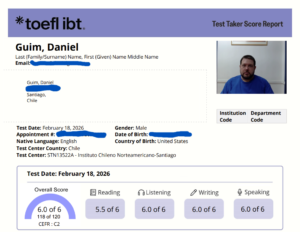A few weeks ago ETS announced that some big changes to TOEFL are in our future. There are also some improvements that have already taken affect. In this blog post I break down what has been officially announced and my take on everything. You can read the official announcement in its entirety here.
What has already changed
The first area of changes has to do with the At Home edition. According to the official announcement, there are now:
- ETS-trained in-house proctors for consistent support throughout the testing session
- AI-assisted identity verification (ENTRUST) to confirm test taker identity while easing check-in friction
- Simplified registration and test-day workflow, reducing stress and administrative hurdles
This is a much-needed change and one that I’m glad is happening. I’ve heard so many stories of people having problems with test proctors that it really affected their experience. If AI can be used to make the check in process easier, that will be a huge help in make the overall experience better for everyone involved.
Changes to test centers
The second major change is related to test centers. ETS states that each test center will have:
Upgraded audio equipment: All test center headphones worldwide are being replaced with state-of-the-art custom ‘stereophones,’ developed in collaboration with renowned audio brand Koss.
It is unclear if this is already happening or will be in place when the other changes happen in January. In any case, better audio equipment will make for an enhanced experience for test takers.
Changes to scoring, registration, and score reporting starting in January
Here we have a variety of small changes. According to ETS:
In addition to their traditional scoring, TOEFL iBT will introduce an intuitive score scale of 1-6.
This additional score will directly align with the Common European Framework of Reference for Languages (CEFR) – the world’s most widely recognized English proficiency framework, making score interpretation simpler and more consistent:
- Score reports will display both the 1–6 banded scale and the traditional 0–120 scale
- Institutions will receive training and resources to ensure a smooth integration
- Test takers can better connect TOEFL scores to prior learning and familiar benchmarks such as the CEFR
There are also some enhancements to registration and score reporting:
- Simplified registration: A redesigned process makes it easier to find and book a test—whether at a center or at home.
- Faster score reporting: Students will receive scores within 72 hours or less, enabling them to meet application deadlines with greater confidence.
I see these all as positives, but I am a bit skeptical about the new scoring of 1 to 6. the CEFR levels are so broad, and someone that receives a score of 5 could have language skills much higher than another person that receives the same score. I believe that the 120 scale will continue to be a more accurate indication of a person’s language ability.
Changes to test format and content starting in January
This is the most important area of changes. ETS writes:
ETS will implement a multistage adaptive design for the Reading and Listening sections of the TOEFL iBT. This means the test will adjust in real time based on how a student performs. Additionally, traditional content will be supplemented with modern, equitable topics. The tailored test will:
- Better reflect how students use English in real academic settings, like group discussions and project work
- Use content that is relevant, accessible and carefully reviewed to reduce cultural bias
There will also be:
Expanded prep resources: New materials, including free items, designed to support the enhanced TOEFL iBT experience will be available starting in July.
This is an interesting change. Depending on how the adaptive design, it could change from one question to another, or it could have eventually branch off to a harder set of questions or easier set. The reduction of cultural bias and updated topics is a welcome change and one that is necessary to ensure fairness and validity across the many cultures of the world.
Based on this statement, it also wouldn’t surprise me if they add new sections or tasks to the test. Once the new test prep materials are available in July we will know more.
What does this mean for test takers?
I believe the new test will ultimately be a positive, but it will take more preparation. With new sections and question types, test takers will need to prepare in new ways and learn new formats and strategies.
If possible, I would recommend taking the test before these changes go into effect. There will be a period of adjustment while we all learn the new test and ETS works out the kinks of a new format. The good news is that TOEFL scores are valid for 2 years, so even if you’re not ready to apply to programs yet, you will still have time the following year.
If you found this helpful, feel free to share it with others. If you need TOEFL preparation, you can complete the contact form to get in touch.



